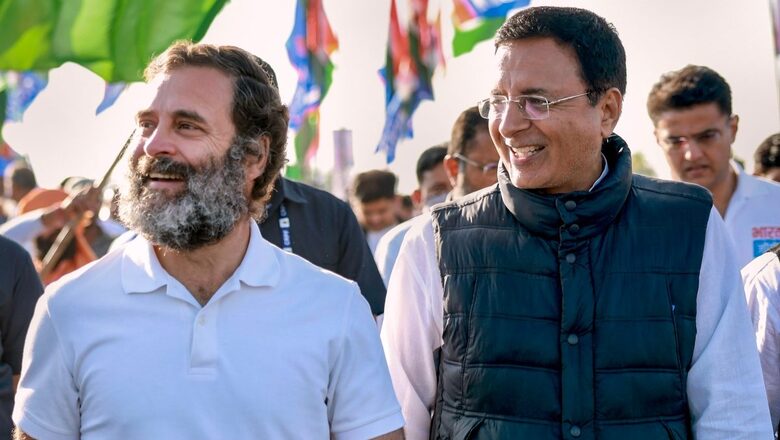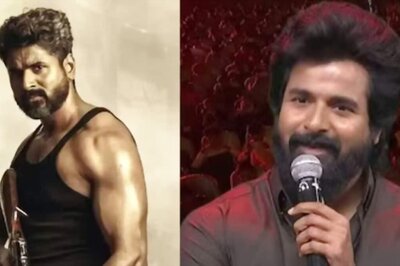
views
Congress spokesperson Randeep Surjewala’s characterisation of the Bharatiya Janata Party (BJP) voters as ‘demons’ with ‘devilish traits’ comes across as an egregious affront to the democratic process. But it stems from nothing more than a deep frustration at his party’s inability to connect with the electorate.
Surjewala’s angst is understandable and speaks to his commitment to his party and leader, who likened the prime minister to the uber-demon, Ravana. It does not, however, justify Torquemada-style rants, i.e., those who do not subscribe to the one true (Congress) ideology are evil. “I curse them,” he said. What’s next? Punishing the unbelievers?
Contrast the Congressman’s approach to voters with that of PM Modi in his tenth Independence Day speech. The message implicit in both their remarks was ‘vote for me, not for the other guy’. But Modi was respectful and humble, subtly putting across the notion that it was very much in the voters’ self-interest to give him another term. Without once mentioning elections, he made citizens party to his policies and governance by acknowledging that they had empowered him with a full majority, in contrast to rag-tag coalitions.
The difference is stark: the Congress rhetoric draws from fear and frustration, Modi’s from hope and positive reinforcement. He encourages citizens to reimagine their place in the economy, society and culture, and to see themselves as agents of change rather than recipients of largesse. The majority of young voters are moved by ideas, not ideology. A fact that Surjewala, like his compatriots, has failed to grasp. In the realm of ideas, the Congress, with all its immense intellectual capital — lawyers, economists, administrators, public policy experts — has so far proved no match for Modi.
For the aam aadmi, ‘Viksit Bharat’ and all that it implies, carries far more weight than ideological rants. The Congress’ idea of India is unclear to them, whereas Modi’s idea of a developed India is clear and credible, because of the transformative momentum built over the last nine years. Therein lies the rub. The Congress cannot fault Modi on development. Had it possessed the political will, it — and not the BJP — would have taken ownership of JAM (Jan Dhan-Aadhaar-Mobile), UPI, DBT, GST, faceless assessment, FASTag and high-speed internet, initiatives that have redefined business-as-usual for the majority of India’s population.
Nor can the grand old party take issue with Modi’s sweeping reforms, be it in banking, taxation or the space sector. It left a legacy of NPAs; Modi cleaned it up. It had mooted a unified common market; Modi made it happen. Unlike 2004, when the NDA was stumped by the ‘Aam aadmi ko kya mila?’ campaign, today it has plenty to showcase. For starters, delivery of housing, cooking gas, piped water, sanitation and internet connectivity to rural areas. It doesn’t need to be 100 per cent or even 50 per cent; the demonstration effect is enough.
Conceptually, no party can question Digital India, Ujala, the Semiconductor Mission, Gati Shakti, PLI (production-linked incentive), eNAM, GeM, Make in India, Beti Bachao Beti Padhao, Start-Up India, UDAY, Ayushman or any one of a score of other schemes.
As for national security and foreign policy, Modi virtually owns the former and received a thumbs up from a former UPA minister on the latter.
Prima facie, there are no chinks in Modi’s armour. Time and again, ad hominem attacks on Modi have flopped. The electorate doesn’t care about his marital status or educational qualifications. And no significant instance of corruption has tainted his government.
How, then, can the Opposition differentiate itself from the BJP? What more can it offer? In the absence of a credible vision statement, Opposition to Modi perforce centres around ideological issues: Hindutva, intolerance, muzzling of free speech, undermining of institutions, abuse of power, minority rights, threats to the Constitution and so forth.
Assaults on civic freedoms will be taken seriously by citizens, provided the Opposition can adequately demonstrate that lines have been crossed. Ordinary citizens, going about their quotidian activities, pay scant attention when a politician is targeted by enforcement agencies. The challenge is to pick and package issues that are relevant to them.
In pursuit of the elusive voter connect, the Congress has sought to instrumentalise freebies. The tendency to fall back on the ‘mai-baap’ culture of patronage argues for a dearth of imagination and an inability to come to terms with a technology-driven, fast-changing, increasingly competitive world.
It’s not enough for the Congress to demonise the BJP, it must show that it can do even better. It could, for example, focus on unemployment and food prices, provided it does its homework and come up with facts, figures and solutions. Instead of following the liberal elite in dubbing those who don’t agree with its point of view as ‘stupid’ or worse, it must address the deficit of ideas.
Bhavdeep Kang is a freelance writer and author of ‘Gurus: Stories of India’s Leading Babas’ and ‘Just Transferred: The Untold Story of Ashok Khemka’. A journalist since 1986, she has written extensively on national politics. Views expressed in the above piece are personal and solely that of the author. They do not necessarily reflect News18’s views.




















Comments
0 comment